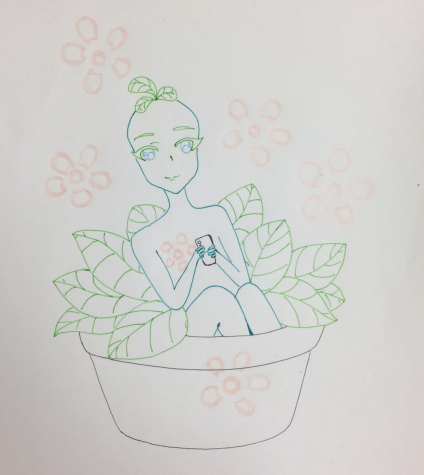The healing nature of digital minimalism
September 17, 2020
With so much going on, we can easily feel as if we are trapped in a bottomless pit of apocalyptic news, and this sentiment rings especially true if we compulsively check our devices. Since many facets of our lives have moved online, we are now extra susceptible to spending more time than we’d like to on screens, and doing so leaves some of us feeling overstimulated, anxious and empty.
No one deserves to feel this way.
As cultural critic Jenny Odell puts it, “It’s just unfortunate that the media through which we interact with other people, and with the news, are actively designed to be addictive and ultimately feel very harmful.”

The basic idea is this: we all deserve to feel at least moderately okay — and even good, when possible. When times are grim, it’s normal to feel devastated, but excessively scrolling, while completely understandable, can make us feel worse. And like I said, we all deserve to feel okay.
In the era of the infinite scroll, it can be easy to lose sight of the optimal function of your free time: rejuvenation.
We often criticize the addictive nature of social media platforms, but oftentimes, what we’re actually critiquing is their potential for emotional damage; for instance, this harm can arise from the lost sense of autonomy or the sense of time misplaced by doing things we don’t genuinely enjoy.
In life, all we really have is time, anyway. To the extent that your life is valuable, I think that your time and attention are valuable, too.
Tech companies take this in a literal sense, seeing our time and attention as resources to compete for and commodify. Financially incentivized to maximize user time spent, these companies employ teams of engineers who deliberately design with this narrow goal in mind — often without any regard for the user’s wellbeing. Many of us feel an almost magnetic pull to our devices. This is not a coincidence. It is a collective feeling, an engineered desire. This is the attention economy.
With so many people profiting off using your psychology against you, how can we reclaim our time and attention? In other words, how can we resist the attention economy?
Jenny Odell, mentioned above, embodies resistance in the spirit of protest and self-care. She balances mindful Twitter use with bird watching and nature bathing, and she even wrote a whole book called How to do Nothing: Resisting the Attention Economy. On top of that, the tech industry can be quite problematic in general, and there’s a lot to defy besides attention-based issues.
Odell practices what some would call digital minimalism, a form of resistance that revolves around tech intentionality. Digital minimalists, as defined by Cal Newport, espouse “A philosophy of technology use in which you focus your online time on a small number of carefully selected and optimized activities that strongly support things you value, and then happily miss out on everything else.”
This ideology radically reorients the way we view and use our devices; when we engage with them on our own terms, they can even remind us of the deep sense of entertainment we are all worthy of experiencing.
Digital minimalism, on the surface, helps us mend our relations to devices. But what’s truly so wonderful about it, and too often overlooked, is that customizing our tech lives can ultimately help us heal our relationships with ourselves. Doing so can help us internalize, on an individual level, how we all deserve to feel good.







